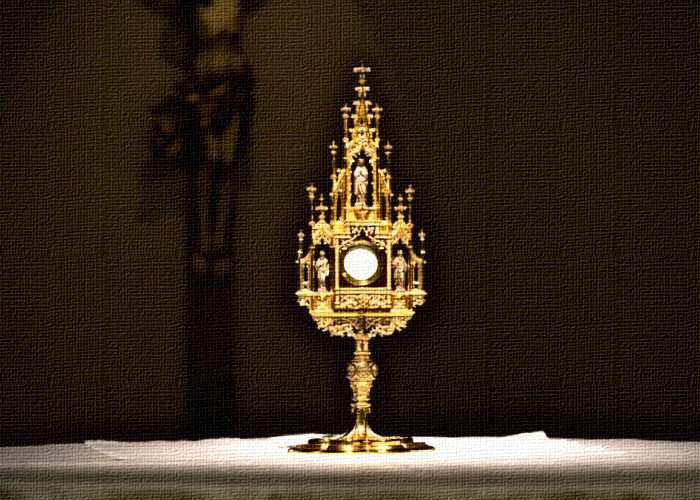Joe Heschmeyer – Catholic.com
1. Strange. First, as we’ve already seen, the proper Christian understanding of the Eucharist must be strange, and hard to accept. That’s how it was initially received, and Jesus did nothing to dispel this impression. If he were trying to present an easy teaching and was just being misunderstood, why would he not clarify?
2. Sacrificial. St. Paul compares the eucharistic sacrifice to the pagan and Jewish sacrifices of his day, pointing out that “those who eat the [Jewish] sacrifices” become “partners in the altar,” whereas those who eat the pagan sacrifices become “partners with demons” (1 Cor. 10:18-20). He draws a clear parallel between “the cup of the Lord” and “the cup of demons,” as well as between “the table of the Lord” and “the table of demons.” Read that again: he describes what’s happening in the Eucharist by comparing it with what takes place at demonic altars (v. 21). If your understanding of the Eucharist isn’t a sacrifice comparable to the fleshly sacrifices offered in the Temple in Jerusalem or in pagan rites, then you don’t believe what Paul believed.
3. Serious. Paul recounts for the Corinthians the events of the Last Supper, which he says he “received from the Lord” (1 Cor. 11:23). Paul never met Jesus during Jesus’ earthly ministry; it seems that what he’s about to relate concerning the Eucharist he learned through a special revelation from him. If that’s right, it speaks to just how seriously Jesus takes the Eucharist. He doesn’t just leave it up to us to figure out how best to commemorate or honor or worship him.
And for those who don’t take the Eucharist seriously? Paul warns that whoever “eats the bread or drinks the cup of the Lord in an unworthy manner will be guilty of profaning the body and blood of the Lord,” since whoever “eats and drinks without discerning the body eats and drinks judgment upon himself” (vv. 28-29). He even adds that this is why many of his Corinthian readers “are weak and ill, and some have died” (v. 30). (It’s hard to square this seriousness with a symbolic view of the Eucharist. After all, if the Eucharist is simply a symbol reminding us of Jesus’ death and resurrection, Paul would be saying here, “If you don’t find this symbolic reminder helpful, Jesus will send you to hell!”) If you think it doesn’t make sense to say that anyone approaching this mystery unworthily risks damning himself, then you don’t believe the same thing as Paul, and he received his views from Jesus.
4. Sacramental. In his commentary on John 6, the Evangelical biblical scholar D.A. Carson admits that the early Christians understood the Eucharist not merely as a symbol or as a reminder of Jesus’ past action, but as a sacrament. And they believed that the sacraments were capable of “conveying grace in and of themselves” (281). That is, they’re not effective simply because we believe in them, or because they remind us of God, but because God is doing something miraculous through them. Carson points out that even St. Ignatius of Antioch “adopts a sacramentarian stance” (277). Why does this matter? Because Ignatius seems to have been a disciple of the apostle John, and he’s writing around A.D. 107, only about seven years after the death of the apostle. If anyone can shed light on what John 6 means, surely it is one of John’s own students.
What’s more, we don’t find any evidence of some kind of early Christian outcry against this teaching—of people telling Ignatius he’s betraying the theology of John and the other apostles. In fact, as we’ll see later, Ignatius assumes that,in the year 107, a faithful Christian is someone who takes a sacramental view of the Eucharist. If your beliefs about the Eucharist aren’t sacramental, then they’re not compatible with the beliefs of those who knew the apostolic preaching and teaching way better than we do.
5. Shocking. The crowd didn’t just find the teaching hard, or strange—they found it repulsive, because they mistook it for cannibalism. And that didn’t stop with John 6. One of the oldest arguments against Christianity from the ancient world is that Christians were engaged in ritual cannibalism, a misconception that seems to have stemmed from misunderstanding the Eucharist.

